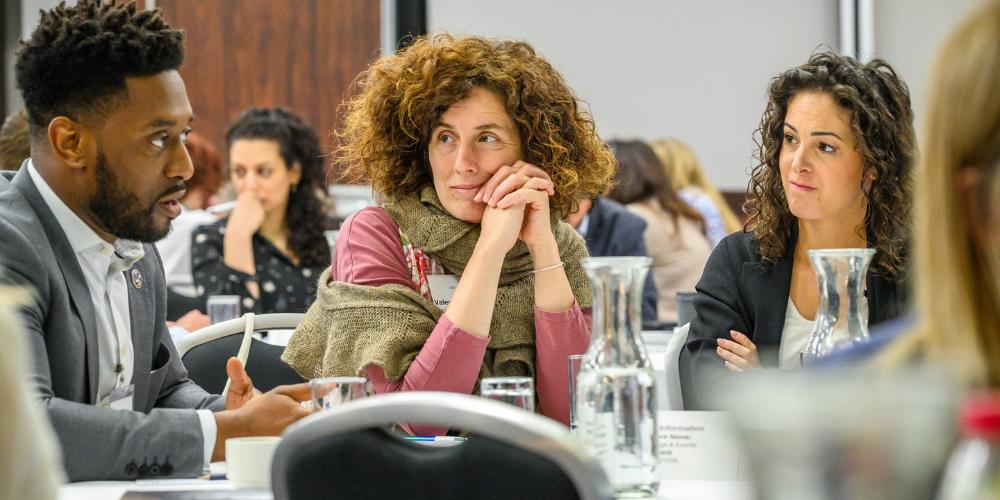
Baringa’s Kate Moss co-led a workshop with Sanofi's Vicky DiBiaso, VP Global Head Patient Informed Development & Health Value Translation, and patient advocate and author Alfred Samuels.
The workshop aimed to explore how clinical trials can be better integrated into the holistic healthcare journey, from disease onset to healthcare interventions and ongoing disease management. It also encouraged discussions on how understanding patient perspectives early during clinical development can improve their trial experience and help inform strategies that make new therapies more accessible and easier to use once launched.

The conference highlighted that awareness and knowledge of clinical trials remains insufficient among patients, healthcare professionals, and the general population – restricting access to and participation in trials and creating challenges in enrolling diverse and representative participant populations. Attendees discussed the importance of reducing clinical trial burden and improving participant experience.
These challenges were considered multi-faceted involving the whole ecosystem across industry, governments, healthcare systems, regulators, policy makers, HCPs, patients and patient organisations, and service providers, e.g., CROs.
Below, we share the recommendations put forward by attendees to help improve awareness, understanding and participation in clinical research.
- Improve clinical research education and awareness through integrating clinical trial education with public health campaigns delivered by trusted ambassadors; training programs for healthcare professionals (especially junior doctors and primary care physicians); and community outreach efforts through partnerships with patient organisations and local venues.
- Centralise trial information via a user-friendly, multilingual platform linked to electronic health records and public health portals.
- Ensure clinical trial campaigns demystify and positively reshape public perception of trials using lay language.
- Standardise the integration of clinical research into care pathways through implementing policy initiatives and guidelines that promote the adoption of early consent models, link trial information with digital health records to facilitate enrolment and establish clear diversity, equity, and inclusion (DEI) expectations aligned with ICH E6 (R3) standards.
- Co-design clinical research with patients and communities that addresses real patient need and accommodates their lived experience, reducing participant burden and offering meaningful incentives and peer support to build trust and sustain trial engagement.
- Democratise patient registries and patient experience databases to facilitate shared insights and accelerate collective learning that will continuously improve clinical trial design, execution and the associated participant experience.
- Invest in centres of excellence for disease-focused clinical research to foster collaboration across the healthcare ecosystem, build HCP expertise and specialist skills, improve access in underserved areas, and strengthen local research infrastructure.
Although there is no single responsible group, systemic change requires coordinated efforts across healthcare ecosystems and a desire to drive progress. Each stakeholder has a key role in improving patient outcomes and advancing clinical research. Below, we propose some key actions each stakeholder group can take to support and drive meaningful change:
- Healthcare professionals - “the gateway to clinical research” - can become pivotal in advancing patient participation by continuously educating themselves, actively engaging in research opportunities, viewing clinical trials as a viable treatment option, and integrating patient experiences into their roles as prescribers and clinicians.
- Industry - “a catalyst for R&D innovation” - can spearhead cross-sector collaboration to significantly raise awareness, elevate education, and broaden access to clinical research. By deeply partnering with trial sites, patients and patient organisations, and various health focused local stakeholders they can co-design trials that truly meet patient needs, foster robust participation, and ultimately strengthen trust in clinical research.
- Governments, healthcare systems and regulators - “the architects of the ecosystem” - can play a transformative role by embedding research into public health policies, care pathways, educational campaigns, and professional training programs. By prioritising research, they can create a more supportive and integrated environment that fosters innovation and improves patient outcomes.
- Patient Organisations - “the vital link between patient communities and the broader healthcare ecosystem” - can advocate for systemic change, provide comprehensive patient education, and act as trusted intermediaries. Their role in building trust and belief in clinical research is indispensable.
- Patients - “the cornerstone of research and medical progress” - can educate themselves and their communities to be clinical research advocates. By engaging with communities, participating in registries, and collaborating with industry, patients can unlock research opportunities and share their experiences to transform clinical trials from being researcher-led to community-driven.
- Employers – “reducing barriers to participation” - can address time away benefits to facilitate access and participation to clinical trials as part of their medical benefit structure.












